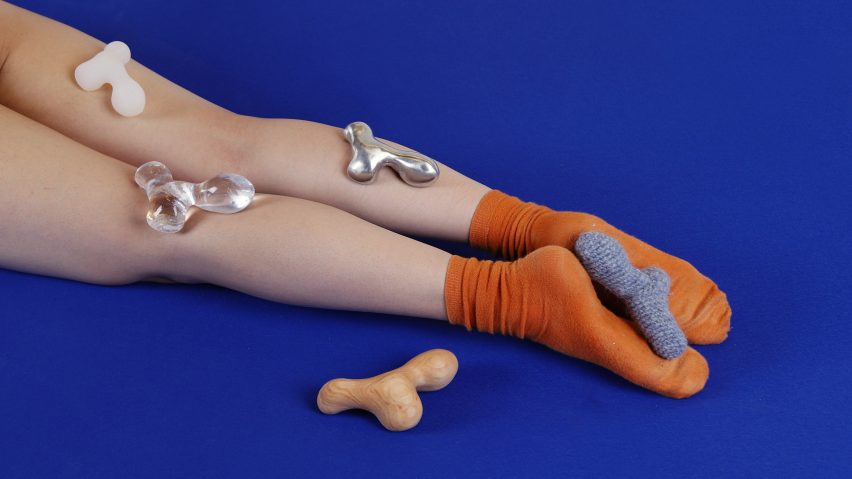Wood and wool feature alongside silicone in the Rituals of Sexual Pleasure series of sex toys, designed by Coby Huang as explorative tools rather than solely for penetration and vibration.
The Rituals of Sexual Pleasure (ROSP) kit was created for users to embark on a series of experiments, using different material probes and haptic balls of various textures to work out what and where sensations feel good to them.
"There are so many sex toys on the market to choose from, but do we really know what we want," asked the designer.
"Do we know what excites us and makes us orgasm? People forget that penetration is not the only way to reach orgasm, and an orgasm is not the only way to feel pleasure. So rather than just buying a one size fits all sex toy, I think it's about having toolbox to explore our own body."
With the ROSP toolkit, Huang hopes to bring together all the cognitive, emotional, and physiological processes that make up sexual arousal into a more holistic approach to masturbation.
This starts with a preliminary educational step in which a 3D model of the outer part of the vagina and the clitoris is used to help women familiarise themselves with their sex.
It comes complete with labelled drawings to help women better speak about and understand their anatomy in terms of pleasure, rather than the typically reproduction-focused terminology used within sex education.
The second step focuses on trialling the different material probes. Each features the same organic, three-pronged form, which is designed to fit easily in the hand while steering clear of traditional phallic shapes.
"I worked with wood, glass, silicone, tin, and wool because these materials provide different qualities: soft and hard, cold and warm, heavy and light, smooth and rough," Huang told Dezeen.
"The probes are not just for stimulating the genitals but also the whole body, to figure out what kind of touch can enhance and maintain sexual arousal. I think those different sensations are around us all the time but we don't take time to notice, discover or put words to them."
From there, the user moves on to the haptic balls, which are fastened to a stick to be tested on the body. They come in five different surface textures – smooth, spiky, bumpy, wavy and spiralled – as well as in different levels of hardness.
The kit also explores the classic element of vibration, albeit in a much more personal way. Women can trial three different vibrational patterns in step four, to work out which works best for them.
"Model O focuses only on the clitoris and Model R on both clitoris and labia, while Model W covers the general genital area," explained the designer.
In the future, Huang is hoping to establish the toolkit as part of system with a fifth and final step wherein, based on the results of these experiments and any additional requests, she can then create a bespoke sex toy tailored to the preferences of that person. This would be created alongside a wider "ritual" including a bespoke scent and soundscape.
"The prototypes I have made have a modular design so they can be customised for people's needs," she explained. "The base is a half donut shape, so that different attachments can be added on either side."
The ROSP toolkit was Huang's master's degree project from Konstfack university, and was featured alongside 24 others in the Young Swedish Design exhibition during Stockholm Design Week earlier this month.
The exhibition will go on to tour across Sweden and internationally to champion the country's most interesting, emerging designers.
Various other projects featured in the show sought to question our taken-for-granted associations with different materials – among them a collection of vases by Julia Olanders made from otherwise hidden substances like concrete and insulation foam.
In recent years, challengers to traditional, phallocentric sex toys have been coming in hot and fast, with Wildflower launching a non-binary object to suit all kinds of bodies and RCA graduate Wan Tseng creating wearable erotic devices that mimic the sensation of grazing fingertips or a whispered breath.
Photography is by Domka Spytek.

